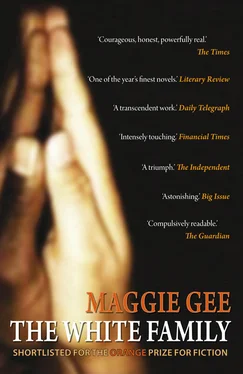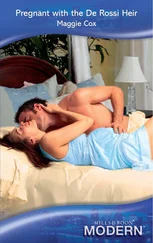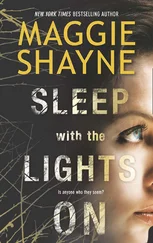And the bus had kept him waiting for half an hour. Three bloody buses went sailing past while he was ringing up the till in the shop. Then as soon as he got out to the bus stop, sod all. It was freezing cold, with a bitter wind. So then he’d gone in the pub for a drink. First you felt warmer. Then colder than ever. And he had to go back to the bus stop and shiver. He could have walked but his trainers hurt him, pressing on his corns, savage, spiteful. They were cheap, weren’t they. Because he was poor. Going by bus was for poor people too.
Which was why they fucking mucked you around when you tried to pay with a five pound note (it wasn’t like a twenty, or even a ten).
The driver had looked at Dirk as if he was rubbish. ‘What’s this?’ he had said. ‘I don’t want this. Haven’t you read the notices? Can you read? It says “Tender exact money please.” In plain English.’
And so on and so on, blah blah blah, while Dirk tore his pockets searching for change, and there wasn’t any, not even ten pee, and the whole bus was glaring and muttering as if it was Dirk’s fault the driver was a tosser.
They’re all in it together, of course. Look around this bus and you can see it. Ninety per cent coloureds. Well, fifty, at least. And the driver’s coloured, so they’re on his side. And he has the fucking cheek to talk about English. As if they owned it. Our speech. Our language. (Tender exact money … that’s not proper English. Does a normal bloke use a word like ‘tender’?)
The trouble is, they do own most things. They’ve taken over the buses, and the trains. And the bloody streets. You can’t get away from them.
Not down our pub, mind. They know what’s good for them.
The woman next to Dirk was very old and very fat, perched awkwardly upon the seat. A man’s overcoat half-covered her sari. Indian people smelled of funny food. As the bus rounded a corner, she suddenly flung out one great fat arm upon Dirk’s lap. ‘Do you mind?’ he asked her, stiff, outraged, but he didn’t want to touch the arm to move it away. She smiled and nodded, not understanding, muttering some mumbo-jumbo at him. He turned away, furious, disgusted, but there was no way to escape her body, brown, gigantic, pressing upon him, old people, he hated them, and now his dad was suddenly old.
He felt beneath his jacket for the thing he kept there that always comforted him, always helped him. His fingers found it, pressed it — pressed — pressed until there was no more blood in his fingers, pressed until all the life was gone, and when the pressure reached the point of pain he released it again, and breathed a bit easier, for he could simply cut them up, if he had to, slice off their limbs, their eyes, their hair …
Women and coloureds. They were everywhere.
He’d never liked women. Except his sister, till she went funny, till she went mad. And now he hated her worse than the others. Because Shirley had once been something of his own, she used to make him feel he was a bit special, but then she’d turned against her own flesh and blood.
He hated his family now. Except Dad.
Flesh and blood. It was meat. It was nothing.
Thomas was back in his high flat, writing. Or staring at the manuscript he should be writing. He was trying to write about the Death of Meaning, but would it mean anything to anyone else? He had a page by Mikhail Epstein open in front of him, which last week had seemed to explain the world. ‘Post-postmodernism witnesses the re-birth of utopia after its own death …’
He scratched his head. Was he growing more stupid? Less modern, perhaps? Less post-postmodern? Thomas’s mind began to drift.
Sex snapped on to it, like a magnet.
Could he hear Melissa above his head? Four o’clock. She would still be in school. Mornings and evenings were the hopeful times when he might hear her sweet feet padding on his ceiling.
Melissa. The first Melissa I’ve known. The name is cat-like and swift, like her. Honey-tongued, delicate, purring, golden …
Very groomed, was Melissa, in the early mornings, when he chanced to meet her on the stairs. Stumbling back upwards with his milk and his Guardian and his pyjamas under his clothes, he sometimes heard her come tip-tipping downwards in her brisk black booties with their sexy eyelets –
Six slick eyelets, slim pale ankles. She smelled of cinnamon, apples, musk, and soap and cornflakes and cleanliness. He probably smelled of old beer and bad breath but she still favoured him with her celestial smile, always slightly surprised, as if she thought she was on the moon and had just discovered that someone else lives there. ‘Oh, hello. You’re up early.’ As if she wasn’t always up early. Her job was so hard he shuddered to think of it, teaching hordes of savage young children. How could they ever appreciate her?
I could protect her. I could look after her …
Actually of course he had little to offer. A bad track record with relationships, a three-bed flat in a seedy part of London, a day job as senior librarian, one novel, written eight years ago (influenced by Proust and Woolf and relativity theory, though no one noticed — The Wave, the Bridge and the Garden , a title he now agreed was too long), a middling income he overspent, a guilty slither of credit cards, a second-hand car, a gift with words, his amazing penis, currently unused, needing tenderness, loving, licking …
Melissa does like me . It isn’t an illusion.
But her eyes were bright, unkindly young, seeming to pierce beneath his skin.
Am I any good? Is there any point to me? What shall I leave behind on this planet?
Books. Words. The English language. I try to serve it. (And other languages. We have to now. Three-hundred-odd languages are spoken in London, and people expect us to have books in all of them. Which is fair enough … Or maybe too fair. Sometimes I feel it’s all gone too far. But I’m not allowed to think things like that. Librarians are servants of the people.)
He was writing his second book, very slowly. He’d been writing it for five years, to be honest. Postmodernism and the Death of Meaning . Perhaps non-fiction was harder than fiction. He hadn’t exactly got a publisher, though he’d sent a synopsis out to nine or ten editors, and one of them responded very encouragingly, wishing him the best of luck with finishing it, but begging him not to send the manuscript in case it should get lost in the post. Thomas still blushed with indignant shame, remembering what his ex-wife had said: ‘It’s twaddle, isn’t it, you great lummox. Is this all you learned at university?’ (Could she be right? Was he wasting his time?)
It was Thursday, the library’s half-closing day, the day when his book should be sprinting along. Pull yourself together, he told himself. Forget about the book and set off for the hospital. See how Alfred’s getting on.
It didn’t seem believable that he was in hospital. Alfred who was never ill … A man of iron, Darren’s Dad. They’d kept him in for a week already.
Thomas had decided to go and visit now, at once, in case Alfred died. Not that he often went round to the house (every few years? twice a decade?) — but he liked to know Alfred was there . Somewhere. The family he had always known. Safer than his. More stable than his parents, who had broken up, hopelessly, three years before they died, in different hospitals, still rowing by proxy. May wasn’t a good cook, but she’d always made him welcome.
Darren must be forty, if I am. Darren White the Golden Boy. He’s a journalist. Doing very nicely. The twenty-first century belongs to them, the e-mail he-men, the four-a.m.-faxers. Darren’s just married for the third time. Must have found someone younger, glossier.
Читать дальше












